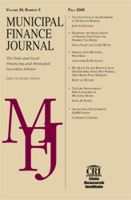The Practice of State Budgeting in Massachusetts: The Long-Term Effects of Tax Limitations and Structural Imbalance
Author: Douglas Snow.; Brendan Burke.
Source: Volume 40, Number 01, Spring 2019 , pp.77-100(24)

< previous article |return to table of contents
Abstract:
This paper provides an analysis of Massachusetts budgetary policy since the close of the Great Recession. While the Commonwealth remains a progressive state, continuing to invest in healthcare and public education, it is facing significant stresses due to a structural deficit. Predominant factors include reliance on volatile capital gains tax revenue and an incremental reduction in the flat-rate income tax rate enacted by initiative petition. The Commonwealth has been successful in controlling Medicaid cost growth, the primary contributor to structural imbalance, but increases in Medicaid enrollment and health insurance costs for state and local employees are still growing at unsustainable rates. To achieve annual budgetary balance, budget makers have employed a number of short-term strategies that include underfunding budget accounts, appropriating one-time resources, drawing down stabilization and general fund balances, and deferring the cost of post-employment benefits and capital asset maintenance.Keywords: Massachusetts, Great Recession, budgetary policy, tax limitations, structural imbalance
Affiliations:
1: Suffolk University; 2: Suffolk University.